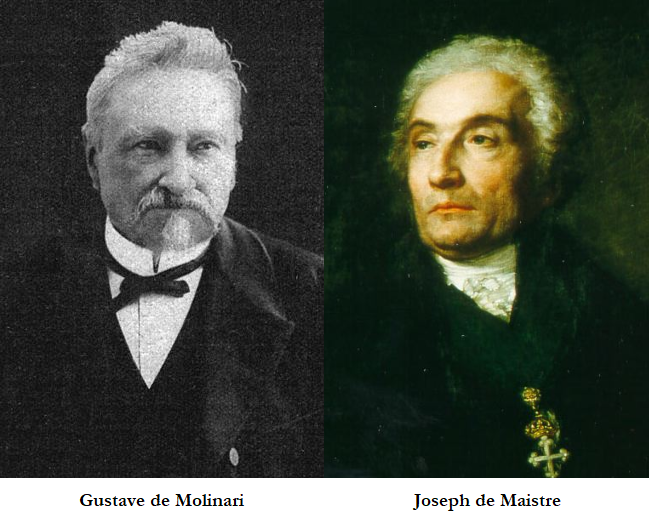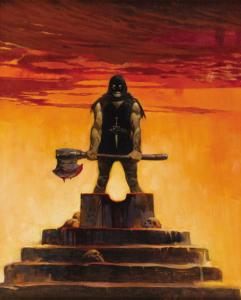The full original French title of arch-conservative Joseph de Maistre’s 1821 Soirées, often translated as St. Petersburg Dialogues, is Les Soirées de Saint-Pétersbourg; ou, Entretiens sur le Gouvernement Temporel de la Providence.
The full original French title of arch-liberal Gustave de Molinari’s 1849 Soirées, recently translated as Evenings on Saint Lazarus Street, is Les Soirées de la Rue Saint-Lazare: Entretiens sur les Lois Économiques et Défense de la Propriété.

That the similarity in titles is intended as a reply rather than an homage is obvious from the fact that all the hostile references to de Maistre are assigned to the Economist (Molinari’s spokesman in the dialogue), while all the favourable references are assigned to the Conservative (one of the Economist’s two opponents).
The following quotation from de Maistre’s Soirées will give a sense as to why Molinari picked him out as the antithesis of the liberal vision of society that Molinari’s book sets out to defend:
[T]his divine and terrible prerogative of sovereigns: the punishment of the guilty … results in the necessary existence of a man destined to administer the punishments adjudged for crimes by human justice. This man is, in effect, found everywhere, without there being any means of explaining how; for reason cannot discover in human nature any motive capable of explaining this choice of profession. I believe you too accustomed to reflection, gentlemen, not to have thought often about the executioner.
So who is this inexplicable being who, when there are so many pleasant, lucrative, honest and even honourable professions in which he could exercise his strength or dexterity to choose among, has chosen that of torturing and putting to death his own kind? Are this head and this heart made like our own? Do they contain anything that is peculiar and alien to our nature?
For myself, I have no doubt about this. In outward appearance he is made like us; he is born like us. But he is an extraordinary being, and for him to be brought into existence as a member of the human family a particular decree was required, a FIAT of creative power. He is created as a law unto himself. …
Scarcely have the authorities assigned his dwelling, scarcely has he taken possession of it, when other men move their houses elsewhere so they no longer have to see his. … A dismal signal is given. An abject minister of justice knocks on his door to warn him that he is needed. He sets out. He arrives at a public square packed with a pressing and panting crowd. He is thrown a poisoner, a parricide, a blasphemer. He seizes him, stretches him out, ties him to a horizontal cross, and raises his arms. Then there is a horrible silence; there is no sound but the crack of bones breaking under the crossbar and the howls of the victim. He unties him and carries him to a wheel. The broken limbs are bound to the spokes, the head hangs down, the hair stands on end, and the mouth gaping like a furnace occasionally emits a few bloody words begging for death. He has finished; his heart is pounding, but it is with joy. He congratulates himself. He says in his heart, No one can break men on the wheel better than I. He steps down; he holds out his blood-stained hand, and justice throws him from afar a few gold coins, which he carries away through a double row of men drawing back in horror. He sits down to table and eats; then he goes to bed and sleeps. Awakening on the morrow, he thinks of something quite different from what he did the day before. …
Is this a man? Yes. God receives him in his shrines and allows him to pray. He is not a criminal, and yet no tongue would content to say, for example, that he is virtuous, that he is an honest man, that he is admirable, etc. No moral praise seems appropriate for him, since this supposes relationships with human beings, and he has none.
And yet all greatness, all power, all subordination rests on the executioner; he is both the horror and the bond of human association. Remove this incomprehensible agent from the world, and in a moment order gives way to chaos, thrones fall, and society disappears.

No comments yet.